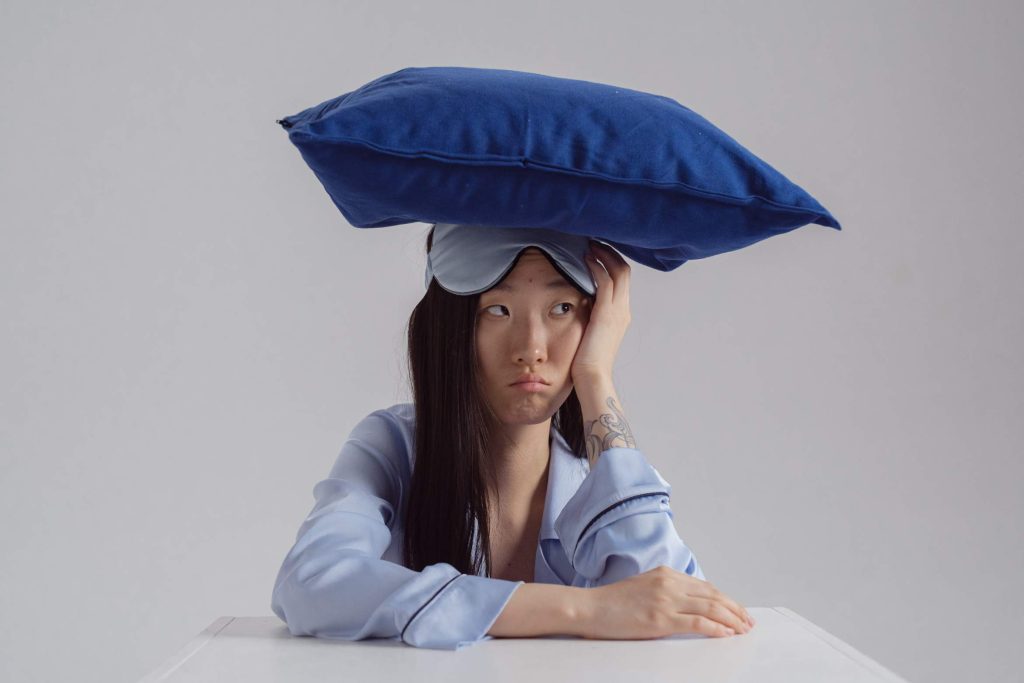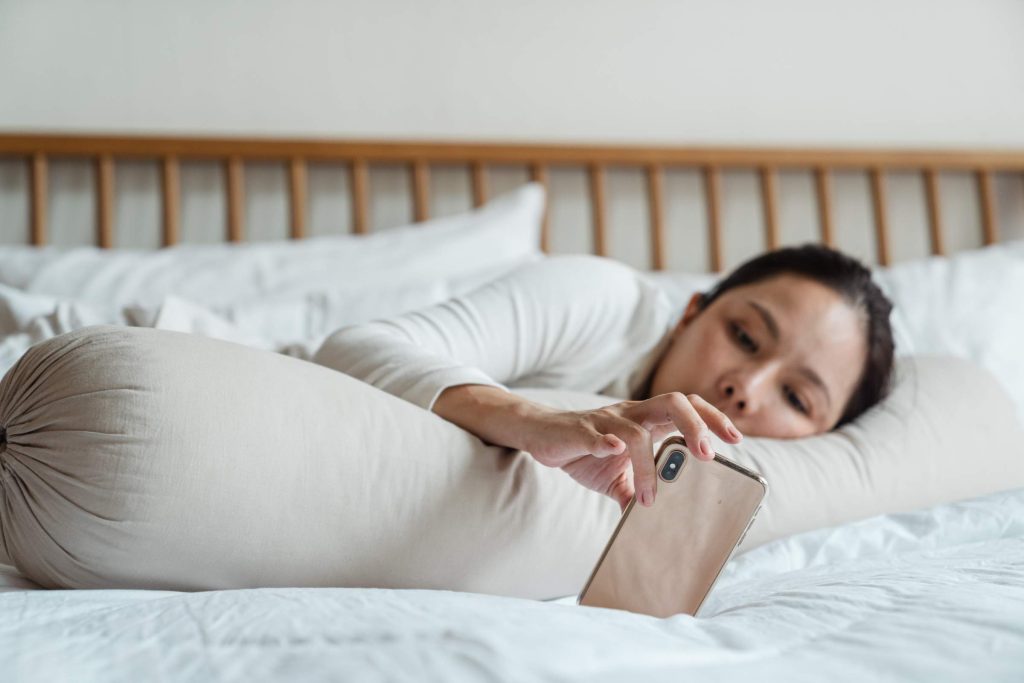The period of menopause is a time when a woman goes through a lot of changes in her life. The changes are mostly hormonal, which go on to trigger emotional and physical changes as well. For some women, menopause comes with a bout of side effects, one of which is insomnia. But what causes insomnia during menopause and how can you deal with it? Let’s dive more into that below.
You are officially at menopause when you have gone a whole year without a menstrual period. Blocks of time prior to that are known as peri-menopause, and the blocks of time after that are known as post-menopause.
During the phase called perimenopause your ovaries start to produce less of your key hormones. Some of the hormones that are affected include progesterone and estrogen. As the levels of these hormones fall you will see more and more symptoms of menopause, one of which is insomnia.
Insomnia is a disorder that prevents people from getting adequate amounts of sleep. It causes difficulty falling asleep but also may make it hard to stay asleep.
What are the Symptoms of Insomnia?

Not being able to fall asleep or stay asleep are the main symptoms of insomnia, but they aren’t the only ones. People with insomnia may find it takes longer than 30 minutes for them to fall asleep. They typically also get less than 6 hours of sleep per night and tend to not get this much every night. They may also find they wake too early when they finally go to sleep and do not feel refreshed or rested after sleeping. They may find themselves worrying about sleep constantly and may feel tired and sleepy throughout the day.
Over time this disruption in sleep can take a toll on one’s health and well-being. It can lead to feelings of:
- Anxiety
- Irritability
- Stress
It can also lead to:
- A hard time focusing
- Difficulty remembering things
- Increase in accidents and errors
- Increased frequency of headache
- Increase in upset stomach and other GI issues
Why Does Menopause Affect Sleep?
Women transitioning into menopause will find that sleep problems will be a definite part of their course. Statistics show that 61% of menopausal women have frequent bouts of insomnia. This is because menopause can affect a woman’s sleep cycle in a couple different ways.
- Hormonal Changes
The decrease in progesterone and estrogen that occurs during menopause can trigger a number of changes. Progesterone is a sleep producing hormone and so when the levels of this hormone falls you will find it harder to fall asleep as well as to stay asleep.
- Hot Flashes
Hot flashes are one of the most common side effects of menopause, followed only by night sweats. With hormone levels fluctuating and sudden surges in body temperature mean sudden surges in adrenaline. Adrenaline is the fight or flight hormone and as the levels of this surge through your body it can have a hard time to recover from these sudden changes. This makes it hard for you to fall back to sleep.
- Restless Legs Syndrome
This is another symptom that women are more likely to suffer from. It feels like creepy, crawly sensations or tingling sensations in your legs at night. It is still not clear whether insomnia increases restless legs syndrome or if women are just more aware of it since they are spending more time awake.
- Sleep Apnea
One Mayo Clinic Study among many others show a correlation with an increased risk of sleep apnea with hot flashes and night sweats. Women who have had surgical menopause tend to suffer more from sleep apnea than those who have had natural menopause. Progesterone has a possible role as well and there may be some association with weight gain.
Progesterone affects daily muscle activity at the back of the throat. It also has an effect on breathing. So a reduction in progesterone levels can cause a partial obstruction of the upper airway and can reduce breathing drive.
Sleep apnea is not simply about gasping and loud snoring during sleep. As a matter of fact, not all women with sleep apnea will snore or snort while sleeping. Women with sleep apnea may also have headaches, depression, anxiety and insomnia along with daytime fatigue.
- Medications
Any medications you are taking can interfere with your sleep. There are many medications that have sleep disturbance as their main side effect. So if you are using an OTC supplement or starting a new medication you want to make a note of how these may contribute to or affect your sleep.
What Are Some Other Causes of Insomnia?

Most of us will encounter sleepless nights at some point in life. Common causes of insomnia are also common causes of the occasional sleepless night. These causes include:
- Stress caused by work or personal relationships.
- Mental health disorders such as anxiety or depression. Many of these disorders come with emotional symptoms that cause sleep disruption.
- A poor diet. Eating too late in the evening and drinking too many stimulants can easily disrupt your sleep patterns and cycle.
- Travelling can disrupt your sleep schedule whether it is by car or plane. Air travel can cause jet lag and the effects can be short term as well as they may be longer term.
How is Insomnia Diagnosed?
If you think you may be suffering from insomnia, you will want to see your primary care physician. They will ask a couple questions about your sleeping habits including the times you are usually awake and when you go to bed. They also may ask how tired you feel during the day and ask you to keep a sleep diary, so they can track your behavior over time to be used to assess your situation in a future visit.
He or she will also want to perform a physical exam to check if you have any underlying conditions that may be the root of your insomnia. There may be the need to do a blood test or a few as well.
If your doctor is unable to determine the cause of your insomnia, they may recommend you spend a night at a sleep center so your body’s activity can be monitored while you sleep.
Tips to Help with Insomnia During Menopause?
There are a number of helps for frequent insomnia, though they may not be cures; they can help you to sleep better. Here are a couple tips to help you sleep better.
Make a Space Designed for Sleep
Many times just a few changes in your bedroom can help to improve your sleep. You want to examine the lighting, temperature and noise in your bedroom. Try to keep your bedroom at a cool temperature that is comfortable for you. Around 65 degrees should be fine. At these temperatures you will find it easier to fall asleep and will be more comfortable to stay asleep. You also want to turn off all the lights, this includes any plugged in electronics that has a small light on there. Turn off cell phones and alarm clocks, anything that may alter your brain even if they don’t wake you up fully. Stop all unnecessary sounds. Remove any ticking clocks, turn off your radio and shut down all your appliances.
Eat Earlier
Try to eat earlier in the day so you don’t have to have a large meal prior to crawling into the sheets. If you have a large meal before bed you put yourself at risk for acid reflux and heartburn which are both uncomfortable experiences especially while sleeping.
Relax
Create a bedtime routine that involves relaxation techniques. Finding a way to relax prior to sleep can help you to ease into it. Try out some mild stretching, some gentle yoga, or listen to some calming music with a sleep timer.
Get Rid of Bad Habits
If you smoke or drink, these habits can be contributing to your inability to get a good night’s sleep. Nicotine found in tobacco is a stimulant and will prevent your brain from properly powering down to sleep. While school is a sedative, these effects are not lasting and so alcohol tends to disrupt your restorative sleep so even though you are sleeping you are not getting too much recovery sleep in.
Is Insomnia Treated Differently When It’s Related To Menopause?
You are having menopause related insomnia, you can find relief by simply balancing your hormone levels. Here are some options:
- Hormone Replacement Therapy. This can help to supplement your estrogen levels which have declined.
- Low dose Birth Control. This can help to stabilize your hormone levels.
- Low dose Antidepressants. These medications can alter your brain chemicals and help to improve your sleep.
You can also try melatonin. This is the hormone that helps to regulate your sleep and wake cycles. You can find this for sale in your local pharmacy and it can help with the restoration of your sleep cycle.
In the event that your doctor suspects your insomnia to be a result of side effects of a medication, they make an attempt to find better options that will not impact your sleep negatively.
Does Menopause Insomnia Go Away?
From time to time we all experience bouts of insomnia. Ut menopause related insomnia can last up to months if it is not properly treated. Here are a couple things you can do to help relieve your menopause related insomnia.
- Take frequent naps.
- Stay properly hydrated.
- Listen to your body and go to sleep and wake up accordingly.
Hormone Replacement Therapy

Hormone Replacement Therapy HRT can help menopausal improve their sleep. It is most useful for women who have vasomotor symptoms and it is these symptoms that are causing the sleep disturbance.
The main aim of HRT is to treat the symptoms brought about by a deficiency of estrogen. Adding progesterone allows the opportunity to add the benefit of increasing non REM 3 sleep. It is recommended that you take estrogen along with progesterone or progestogen to prevent stimulation of the lining of the womb. This is necessary if you have had a hysterectomy.
When sleep disturbance is one of your prominent menopausal symptoms you want to consider using progesterone for the womb lining protection instead of progestogen because progestogen does not have the positive effect on sleep that we are looking for.
There are other medications that are used to treat vasomotor symptoms. These include Gabapentin and Clonidine which are low dose antidepressants. There is also proof that Cognitive Behavioural Therapy helps to improve menopausal symptoms such as anxiety which can produce benefits that can help you to sleep better.
Other things you can benefit from include massage, acupuncture, yoga and isoflavones. If the underlying problem is sleep apnea, you may want to consider the use of a CPAP device. This is a device that you wear on your face while you sleep. The mask is connected to a pump and allows you to receive a positive flow of air into your nasal passages while keeping your airway open.
Remember that menopause is not a disease or a disorder. This is just a stage of life that women must go through. When you can understand the changes that this stage brings on you can be better equipped to deal with them as they come. While each woman has different risk factors, each female of every age wants to get a good night’s sleep. With that said, here are some tips on how you can improve your long term sleep.
- Choose a regular time to go to bed and wake up each day. Stick to the chosen times.
- Avoid napping for longer than 40 minutes during the day.
- Exercise regularly but ensure you do it outside of two hours before your chosen bedtime.
- Pay attention to how the medications you take affect your sleep.
- Don’t go to bed when you are too hungry or too full.
- Don’t have caffeinated drinks in the late afternoon to evening.
- Avoid alcohol as much as possible.
- Ensure your bedroom has a restful feel
- Choose good quality bedding.
- Limit the use of your bedroom to sleep and sex.
If you don’t have trouble getting to bed at night then you may have trouble staying asleep. If you find that you can’t go back to sleep within 20 minutes of waking up in the night, you may want to get out of bed and move into another room. Do something quiet and when you start feeling sleepy head back into your bedroom. Whatever you do, don’t try to watch the time too much and don’t start watching TV.
Do Perimenopausal Women Benefit from Melatonin?
Melatonin is a hormone that is secreted from the pineal gland. It will increase at night and starts to decrease in the morning as your body responds to daylight. It is involved in regulating our normal sleep and wake cycles as well as other important effects.
You can find melatonin for sale over the counter as a dietary supplement. It is a popular natural remedy for sleep disturbances. There is mixed data out there on the effectiveness of melatonin as not everyone seems to respond to it. Unresponsiveness is often seen in those who suffer from delayed sleep phase syndrome.
As we get older, our melatonin levels decrease and so it is not uncommon for perimenopausal women to have sleep issues.
Melatonin may have some other benefits for women in the perimenopausal phase of life. It appears to provide some amount of prevention of postmenopausal bone loss thanks to its ability to inhibit oxidative stress. Supplementing with melatonin though has not shown any obvious short or long term adverse effects, so it is a good safety profile.
If you would like to explore CBT for your insomnia, you can reach out to a member of our team here at ESTADT Psychological Services. You can even take advantage of our free consultation to see if our approach can help you. We welcome your call or email.
Do you struggle with depression?
We have clinicians expert on depression, feel free to read about them, or book a free consultation to review your situation.
